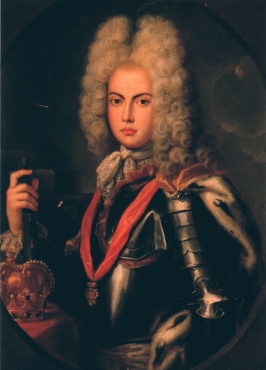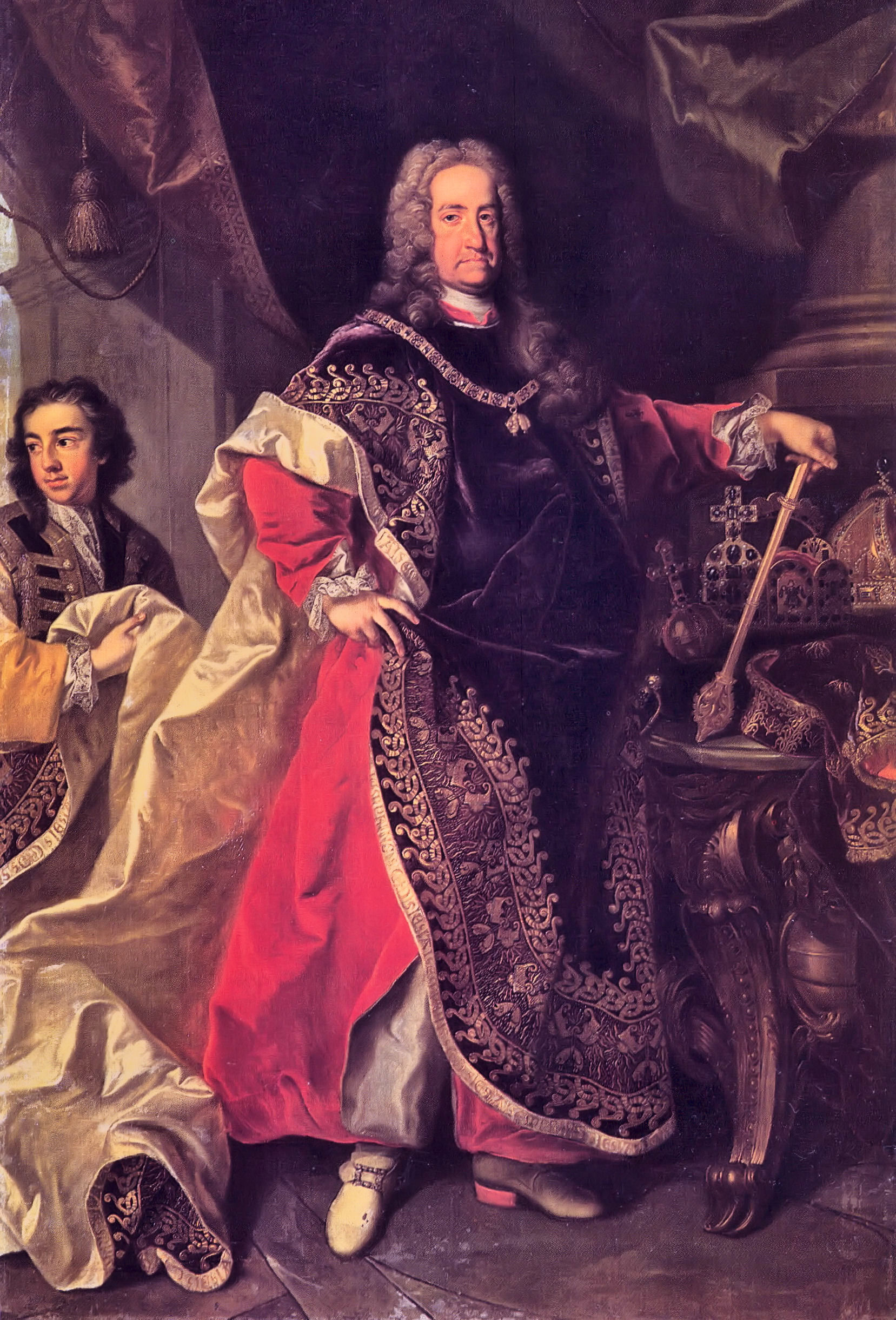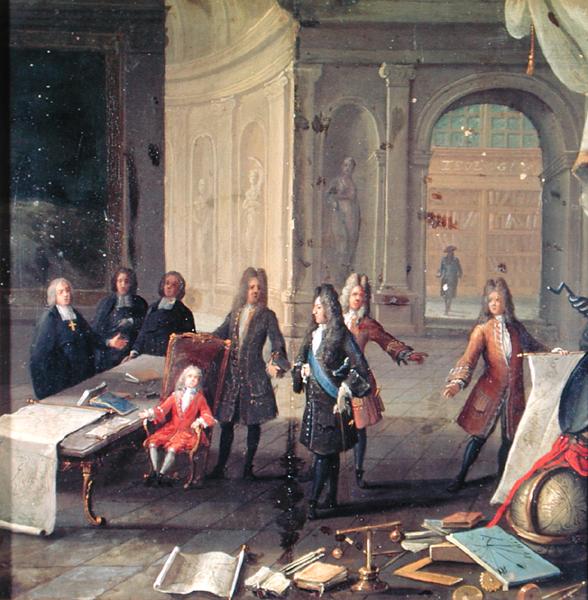The World of Pirates & Zombies is a parallel to the real world of its day, but there are several notable and subtle differences to the Real World events….
The events occur a few years after the end of the ‘War of the Spanish Succession’ more popularly called ‘Queen Anne’s War’. The events of this last war and the looming threat of the next, are the backdrop that largely shapes the events in the Caribbean and the American Colonies.
The important powers in Europe are England, France, Spain, Austria, Portugal, Denmark/Norway and the Dutch Republic. Events in Europe are directly shaped by the Kings who rule their nations by Divine Right. Few of the rulers have any effective limits imposed on them and it is by their whim that wars are declared.
The Rulers of Europe
England:
George I, the German speaking Hanoverian is, By the Grace of God, of Great Britain, France and Ireland, King, Defender of the Faith, Prince-Elector of Hannover, Duke of Brunswick. He ascended the throne in 1714 after the death of Queen Anne.

King George I
Denmark/Norway:
Frederick IV is the King of Denmark and Norway. Frederick and his kingdom are deeply involved in defending themselves from aggressive attacks by Sweden and its King, Charles XII.

King Frederick IV
Portugal:
John V is the King of Portugal, the Algarves and Brazil, Duke of Braganza. John follows a strict practice of remaining neuteral in European affairs, but he honored his father’s (Peter II) commitment to the Grand Alliance in the recent War of the Spanish Succession. His wife is Maria Anne of Austria, daughter of Leopold I, giving John close ties with Austria.

King John V
Dutch Republic:
The Dutch Republic (also known as The Republic of the Seven United Netherlands or “the Seven United Low Countries” also the United Provinces.) The Republic is a confederation of seven provinces and is governed by the ‘States-General’ which consists of representatives of the seven provinces. The Dutch have a merchant based economy and is one of the wealthiest nations in Europe with the largest merchant fleet in the world.
Austria:
Charles VI is the Holy Roman Emperor and Arch Duke of Austria. A major power in Europe but not a significant Naval power.

King Charles VI
France:
Louis XV is the King of France, but he is only seven years old so the real power rests with the regent Phillip d’Orleans. Louis has had a history of poor health and should he die before reaching the age of inheritance (13) the regent will become King, unless Philippe, Duc de Anjou, the OLD French King’s eldest son, who became King of Spain, renounces the Treaty of Utrecht.

Young Louis XV being tutored
Spain:
Phillip V, (Phillippe, Duc de Anjou of France) is the King of Spain. He is also Louis XV’s uncle and WOULD have been King of BOTH France and Spain, except that Great Britain, Denmark, Portugal and other nations won the War of the Spanish Succession and forced Phillip to renounce his claim to the throne of France in the Treaty of Utrecht.

King Philip V
The War
Queen Anne’s War (1702-1713), (the second of the French and Indian Wars in North America) began May 4, 1702. In Europe it was known as the War of the Spanish Succession. The Grand Alliance, (England, the League of Augsburg, Denmark, Portugal, and the Netherlands) declared war on France and Spain to prevent union of the French and Spanish thrones following the death of King Charles II of Spain. In North America, British and French colonial forces, with their Indian allies, raided and attempted to capture a number of each others border settlements. The most notable colonial success was the British capture of Port Royal, Nova Scotia, on Oct. 16, 1710, following unsuccessful assaults in 1704 and 1707; however, a British naval attack on Quebec in 1711 failed. In the South, Carolina forces captured the town of St. Augustine Florida from the Spanish in September 1702, although the fort there held out. Another force wiped out all but one of fourteen Spanish missions in northwestern Florida in 1704.
Considerable naval activity occurred in the Caribbean with the English and Dutch making extensive use of large numbers of Privateers to attack French and Spanish shipping. These privateers, finding themselves unemployed at the end of the war, turned to Piracy.
Queen Anne’s War was ended by the Treaty of Utrecht, which brought the War of Spanish Succession to a close in Europe. By the treaty, France ceded the Hudson Bay territory, Newfoundland, and Nova Scotia to Great Britain. France also agreed to a British protectorate over the Iroquois Indians. France kept Cape Breton Island and the islands of the St. Lawrence.
Should the King of Spain renounce the Treaty of Utrecht it will plunge Europe, and much of the world, into another round of war and probably split France in a civil war.
The Caribbean
It is a time of great turmoil for the Free Booters and Buccaneers in the Caribbean and the rest of the New World.
The Treaty of Utrecht left the privateers unemployed, many of whom then turned to piracy as a familiar way to make a living. Unfortunately this glut of pirates has stimulated the European powers, especially the English, to try and curb the practice.
First the English sent a new Governor to Jamaica, Nicholas Lawes, and then a new Governor to the Bahamas, Woodes Rogers, a former privateer himself. They arrived backed by three powerful Navy frigates and several hundred marines. Lawes soon tamed Port Royal, long regarded as the ‘Wickedest City on Earth.’ Lawes and Rogers were armed with muskets and a Royal Pardon for all who would pledge to give up piracy forever. Many pirates took the Pardon and settled down for a sedate life, the die hards and the most notorious, who were denied the Pardon, upped anchor and moved to New Providence in the Bahamas.
Port Royal, though still a wild and rambunctious city, is no longer a town where the bloody handed buccaneers can walk the streets at will without fear of arrest or restraint. Gentlemen of Fortune can still be found here, but they are circumspect and do not draw attention to their presence. Port Royal is still important to the pirates, it is one of the best places to sell ill gotten cargoes and buy the latest in fashions and learn the news from England.
Only a few months ago Governor Rogers took the next step in the plan to suppress piracy by denying the pirates safe havens in the Caribbean. With the frigates and a few hundred Royal Marines, Rogers moved into New Providence. Again offering a pardon to the lesser pirates and a noose to the die hards and most wanted. Many were caught by surprise, some managed to escape, others were at sea and thus avoided capture.
Governor Rogers has a garrison of a hundred marines at New Providence, the larger portion of the force returning to Jamaica. Since then two of the Royal Navy’s frigates have departed Caribbean waters leaving one frigate and several armed sloops as the Royal Navy’s fleet in the Caribbean.
The pirates have again moved their base of operations, this time to Tortuga, an island claimed and lightly occupied by the French. The lack of a strong French Navy or military presence means that the Governor relies on the pirates to provide protection from the Spanish and ensures that he does not make much of an effort to impose order. This allows the pirates to largely do as they will in and around the town.
The pirates are feeling the pressure. Their lifestyle, freedom and very lives are under threat. True, they can continue to sail and take prizes and raid towns, but their easy access to markets for their stolen goods is being taken from them. They need to sail farther to find ports to sell their booty and the ports they visit are never as safe or friendly as Port Royal and New Providence were. There are four schools of thought amongst the pirates in regards to how to deal with this.
Some have resigned themselves to the end of piracy and are coming to terms with the new order in the Caribbean. The pirates in this group are a declining number, they have largely sought out the King’s Pardon and put away their cutlasses.
Some have chosen to sail to friendlier waters. They have crossed the Atlantic, rounded the Cape of Good Hope and taken up operations in Madagascar. Here they are free to raid shipping in and around India and the Far East. Most of the pirates inclined to this option have either already decamped for Madagascar or are prepping their ships and gathering their resources for the voyage. There are many Caribbean pirates who are unhappy with this option. They don’t know that area, they don’t speak the local languages and are not familiar with the customs and groups that they would be dealing with for markets. Whereas the Caribbean is familiar and comfortable, the dominant cultures are European and there is ready access to the North American Colonies.
Some have taken a ‘wait and see’ position. The theory being that it is only a matter of time before a new war breaks out and the European powers will once again seek the services of the privateers. The governments know this as well and in the interim they won’t allow events to drive the buccaneers out of business completely. This is the attitude of perhaps two thirds of the pirates still operating in and around the Caribbean. For them it is business as usual, avoid the Navy and the noose and wait for good times to come again.
The remaining pirates, a minority so far, who do not fall into the other categories, have a different attitude. They are getting angry! They are fed up with the politics in Europe that cheerfully rely on the blood and guts of the privateers during war, then just as readily hang them during peace. They are tired of the taxes, the soldiers, the rules, regulations and meddling of the Governor and his lackeys. The classes, titles and snobbery of the nobility and their inherited wealth offend their egalitarian sensibilities. They feel that THEY, the buccaneers and free booters, are the real power in the Caribbean. They have the ships and cannon, the men and muskets, they control the sea and the trade. It is time to throw off the yoke of European domination and establish themselves as a power in their own right!
Though these pirates are united in their goal of independence from European control they are divided as to what their new nation would look like once it is established.
Some of the sea wolves speak of the Pirate Republic that once held sway in Port Royal and was later transplanted to New Providence where it flourished for a time. In the Republic the pirates elected Magistrates to resolve disputes between crews and captains to limit bloody infighting amongst the different ships. They talk of a loose coalition of Captains and crews controlling the various islands and coming together for mutual defense and to resolve internal disputes through codes of conduct that favor consensus and equitable division of outside revenues. These pirates refer to themselves as the Brethren or Brethren of the Coast and even now a reduced version of the Republic is based in Tortuga.
Other pirates argue that the ideals espoused by the Brethren are unworkable in large scale and when faced with the pressure that the Europeans will bring to bear. The codes of conduct that the Brethren hold dear are often ignored now, in matters with less on the line then the stakes that the future holds. And they in no way address the issue of ruling the landlubbers and townfolk that will also be citizens of the new order. These pirates argue for their own aristocracy (with the pirates as the ruling class) as the only reliable way of maintaining order and as the only form of government that the European Courts will recognise or treat with as equals.
Both groups recognise the difficulties that lie ahead in the pursuit of freedom. The European powers have large navies and huge armies that could easily crush the pirates. But they argue that the bulk of these forces are locked in place across Europe, defending their countries from rival powers. Even if they freed up large numbers of troops and ships, they would need to cross the Atlantic and fight the pirates in their home waters, one island at a time where the advantages of the pirates, their intimate knowledge of reefs and shoals and greater skill in combat, will outweigh the European’s numbers. The pirates would have allies in the struggle against European control. Many of the Colonies, English, French and Spanish, chafe at the limitations, taxation and regulations that limit who they can trade with, where they can settle and expand, what they can make, sell or buy. Resources in the American Colonies and along the Spanish Main would be available to the buccaneers in the event of war with Europe. Also, though it is only whispered in hushed voices, the pirates know that they have the power of Voudon on their side, something the Europeans, even those living in the towns, not only don’t have, but generally refuse to believe in.

